Islamic State
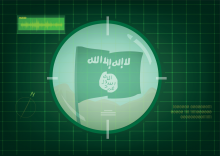
Here at Sojourners we have written a lot about nonviolence. We take seriously the words of Jesus that we should love our enemies and pray for those who persecute us. We believe that violence begets violence, or as Jesus put it, “Those who live by the sword die by the sword.” Personally, I take seriously the words of René Girard, the founder of mimetic theory, that we are now “confronted with a perfectly straightforward and even scientifically calculable choice between total destruction and the total renunciation of violence.”
Many Christians look to the Bible to justify divinely sanctioned violence against our enemies. Excuse me for stating the obvious, but Christians are not Biblians. We are Christians. As Christians, we should be putting Jesus first. Not Deuteronomy. Not Joshua. Not Judges. Not David. Not Solomon. Not Peter. Not Paul. Not the Bible.
Jesus first.
And Jesus calls us to nonviolence. As one of the early Christians stated, the way of Jesus, the way of nonviolent love that embraces our enemies, is the way of the cross and the world thinks that way is foolish.
We proclaim Christ crucified, a stumbling block to the Jews and foolishness to the Gentiles, but to those who are the called, both Jews and Greeks, Christ the power of God and the wisdom of God. For God’s foolishness is wiser than human wisdom, and God’s weakness is stronger than human strength.
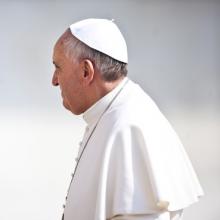
Pope Francis faces no specific threat from Islamic State militants and will not be adding extra security measures on his one-day trip to Albania next week, the Vatican said Sept 15.
The Vatican’s chief spokesman, the Rev. Federico Lombardi, said despite recent “worrying” events that had shocked the world, there was no specific threat to the 77-year-old pontiff as he prepared for his official visit to the majority Muslim country on Sept. 21.
Lombardi said Francis would use the same open-topped vehicle he uses to greet crowds in St. Peter’s Square when he travels to the Albanian capital, Tirana.
“There is no reason to change the pope’s itinerary,” Lombardi said. “We are obviously paying attention but there is no need for concern or a change to his program in Albania.”
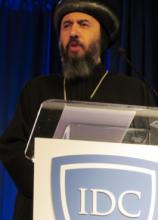
Watching ancient Christian communities stand nearly defenseless as Islamic militants roll across swaths of the Middle East, coalitions of Christians are banding together to sound the alarm and demand government action.
The most recent effort is a three-day conference (Sept. 9-11) in Washington, D.C., which gathered Orthodox Christians, evangelicals, Roman Catholics and others for prayer, speeches and a lobbying push on Capitol Hill.
“If Christian voices are able to ring out as one from Egypt to Syria to Iraq, Lebanon and Jordan, then we really do believe it will be possible for Middle Eastern Christians to survive,” said Andrew Doran, executive director of In Defense of Christians, which organized the conference.
Doran, who describes himself as a Catholic with a great affinity for Orthodox Christianity, said the gathering has shown how Middle Eastern Christians can put aside their sometimes 1,500-year-old disagreements and take up the cause of their beleaguered brethren.
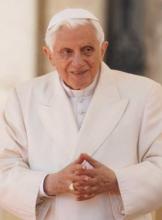
Eight years ago this Sept. 12, Pope Benedict XVI delivered a lecture at the University of Regensburg in Bavaria in which he seemed to diagnose Islam as a religion inherently flawed by fanaticism.
It was an undiplomatic assertion, to say the least — especially coming a day after the 9/11 anniversary — and it sparked an enormous outcry among Muslims and came to be seen as one of a series of missteps that would plague Benedict’s papacy until he resigned last year.
Now, with the Islamic State on the march in the Middle East, leaving a trail of horrifying brutality and bloodshed that has shocked the world, some of Benedict’s allies on the Catholic right are saying, in effect, “He told you so.”
“Regensburg was not so much the work of a professor or even a pope,” wrote the Rev. Raymond de Souza in a column for the National Catholic Register, a conservative publication. “It was the work of a prophet.”

As thousands gathered Sept. 5 at Temple Beth Am in Miami to mourn journalist Steven Sotloff, they paid tribute to the one quality his family and friends tried hard to conceal from his Islamic State captors: his Jewishness.
Sotloff was not only Jewish, he held U.S.-Israel dual citizenship. But during that terrible year of his captivity, dozens of family and friends worked to scrub that detail from any public mention of the 31-year-old reporter for fear he would be persecuted for it. It appears word never got out, though he was brutally beheaded nonetheless.
In death, the Jewish values that informed his life are coming forward. One of the most moving testimonies Friday came from a childhood classmate Danielle Berrin, who writes for the Jewish Journal in Los Angeles.
Speaking to Jose Diaz-Balart on his morning MSNBC talk show, Berrin said Sotloff’s Jewish education was “one of the beautiful things” about him.

When churches conclude their summer hiatus and resume full-scale ministries this week, much will have changed from a year ago — outside their doors.
Conditions might have changed inside, too. But it is the world outside that demands fresh attention in mission and ministry.
Ferguson, Mo., has happened, revealing disturbing trends in law enforcement and deep fault lines between white experience and black experience.
Russia’s aggression against Ukraine happened, threatening a resumption of dangerous tensions between Moscow and Western democracies.
The Islamic State of Iraq and Syria happened, raising the dreaded specter of a take-no-prisoners war on modernity, reason, progress, women and other faiths.
The 113th Congress happened, mired in systemic dysfunction, with one party determined to cripple a black president and to channel more wealth to the wealthy.
The Koch brothers and their megabuck cronies happened, changing the face of electoral politics with unprecedented infusions of cash and ideological vitriol.
The two-tier economy happened, with one tier doing extraordinarily well and a much, much larger tier falling further behind, leaving despair among all age groups.
Border wars between terrified migrants and swaggering white men bearing arms against children happened, threatening America’s true core value as a welcoming nation promising freedom.
These outside-the-walls developments have little to do with the usual church fussing — except to say that it’s time for church people to stop their usual fussing.

From the moment news broke that U.S. journalist James Foley had been beheaded by Islamic State extremists in the Middle East, many Christians, especially Foley’s fellow Catholics, began calling him a martyr, with some even saying he should be considered a saint.
Yet that characterization has left others uneasy, and the discussion is raising larger questions about what constitutes martyrdom.
Foley’s parents seemed to validate the martyrdom label when his father, John, spoke at an emotional news conference outside the family’s New Hampshire home and said he and his wife “believe he was a martyr.” Foley’s mother, Diane, added that her son “reminds us of Jesus. Jesus was goodness, love — and Jim was becoming more and more that.”
In an interview two days later with Katie Couric, Foley’s younger brother, Michael, recounted how Pope Francis had called the family to console them and in their conversation “referred to Jim’s act as, really, martyrdom.”
Numerous commentators had already picked up on that idea, holding Foley up not only as a witness to the Christian faith but as a spur for believers in the West to take more seriously the plight of Christians in Iraq and elsewhere in the Middle East who are being persecuted to a degree that some say is comparable to genocide.
But in the Catholic Church, determining whether someone is a martyr is not so easy. Historically, two conditions must be met.

Pope Francis wrote to the president of Iraq, calling for an end to the “brutal suffering of Christians and other religious minorities” and urging political leaders to end the humanitarian crisis in the country.
Francis said in his letter to Iraqi President Fouad Massoum:
“I appeal to you with my heart full of pain while I follow the brutal suffering of Christians and other religious minorities who are forced to leave their homes, as their places of worship are destroyed.”
Cardinal Fernando Filoni, the pope’s official envoy to Iraq, delivered the pope’s message during his recent trip to that country. The two met at the Vatican on Thursday. The pope previously appealed to U.N. Secretary-General Ban Ki-moon to intervene to end the crisis.
Earlier this week, Francis revealed during a media conference with reporters that he was ready to travel to Iraq to try to find a solution to the ongoing violence.
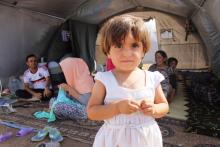
The crisis in Iraq poses two challenges — a humanitarian effort to rescue persecuted minorities, and a security mission to suppress the extremist threat posed by the forces of the Islamic State in Iraq and Syria (ISIS).
The U.S. is right to play a leading role in aiding the Yazidis, Christians, and other threatened minorities in Iraq. The immediate threat against the Yazidis has eased, but minority groups in the region remain endangered by violent extremism. The Obama administration should work through the United Nations to turn this into a genuine international rescue effort. The greater the degree of international participation and support for the aid mission, the more beneficial and legitimate it will be for the recipients.
The U.S. is also right to call attention to the threat posed by ISIS, but we need to do more to mobilize international pressure against the group. The Islamic State is in many respects more dangerous than al Qaeda. It has conquered Mosul and other major cities, taken control of dams and oil facilities, and is steadily expanding its sphere of influence in Syria and Iraq. It has formed a terrorist army with an estimated 10,000 fighters and is now armed with tanks and advanced U.S. weapons stolen from the Iraqi army. The group poses a significant threat to the security of the region and the world.

It’s starting to seem as if the Obama White House operates on a time delay. In the case of Iraq’s religious minorities, the results have been deadly.
On June 10, the barbaric extremists called the Islamic State captured the city of Mosul. By mid-July, they issued an edict to the Christians who remained to “convert, leave or be killed.”
The White House said nothing.
Beginning on July 22, Rep. Frank Wolf, R-Va., took to the House floor six times to plead for attention from the Obama administration as a genocide threatened Iraq.
Not a word from the president.
On July 24, a resolution sponsored by Reps. Anna Eshoo, D-Calif., and Jeff Fortenberry, R-Neb., “condemning the severe persecution [of] Christians and other ethnic and religious minority communities … in Iraq” was introduced on the floor of the House. It called for the administration to “develop and implement an immediate, coordinated and sustained humanitarian intervention.”
Crickets.

Alarm and outrage has been growing over the mounting humanitarian crisis in Iraq at the hands of the Islamic State (IS) also known as ISIL (Islamic State of Syria and the Levant) or ISIS (Islamic State of Iraq and Syria).
Christians in the region are being forced to convert, pay tribute or die as the al Qaeda breakaway group sweeps into predominantly Christian villages and Hamlets in Iraq, sending tens of thousands fleeing for their lives. Other non-Muslim groups, in particular the Yazidi, who practice a faith that predates Islam, are reportedly considered as infidels by the fanatic Islamic State and targeted for extermination in what many are calling a genocide. The U.N. is still gathering numbers but it believes that hundreds of Yazidis have been killed while others, primarily women, have been abducted and taken into slavery. Around 40,000 Yazidis have fled into the mountains of Northwest Iraq where they face the prospect of starvation on mountain or massacre by the Islamic State militants below.
The news is devastating and overwhelming. The suffering and acts of brutal violence staggers the imagination. What would a nonviolent response look like?

Senior leaders in Iraq’s minority Yazidi community say their wives and daughters, forcibly held by Islamic militants, are being given a choice: Convert to Islam and marry jihadists — or else.
Mirza Dinnayi, a senior Yazidi leader and a former adviser on minority affairs to the Iraqi president, said he has spoken on the phone with several women who cry out to him: “I love my husband; my faith is Yazidi.”
Others have attested to harsh treatment bestowed on members of the religious minority by the Islamic State militant group since its gunmen captured parts of Iraq earlier this week.
As many as 200,000 Yazidis left their homes in the Sinjar region of northwestern Iraq. Untold thousands are believed dead and at least several hundred women and children are being held prisoners.
Meanwhile, tens of thousands are stranded on the Sinjar mountain range without access to food or water in an ongoing humanitarian crisis.
Even in a long history marred by persecution, this week’s tragic events stood out.
Police cars have been repainted to say “Islamic police.” Women are forbidden from wearing bright colors and prints. The homes of Shiites and others have signs stating they are property of the Islamic State. And everyone walks in fear amid a new reign of terror.
That’s what life is like in Mosul, Tikrit, and other cities in northern and western Iraq under the control of Islamic extremists after their lightning-fast military campaign that overwhelmed the Iraqi army in June.
The new normal for these residents means daily decrees about attire and raids to root out religious minorities in a campaign to impose strict Islamic rule in cities that tolerated multiple religions for centuries.
Video courtesy of USA Today.
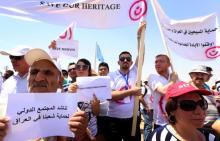
When I first saw Americans joining in solidarity with Iraqi Christians through the #WeAreN hashtag and protest campaign, I was encouraged. Our team at Preemptive Love Coalition had been sounding the alarm about the targeted persecution of minorities in Iraq through private emails and social media messages for weeks, in between making urgent appeals in our effort to provide lifesaving heart surgeries for children amid the violence.
Most of our efforts were largely unsuccessful before the “Islamic State” gave Mosul’s Christians an ultimatum to (1) convert to Islam; (2) pay a submission tax; or (3) “face the sword.”
After Islamist militants began marking the homes of Christians in red paint with the Arabic letter “N” (Nazarene) for extermination or expropriation, we tried again to use our proximity to the problem in Iraq to provoke our friends in America to pay attention by tagging a photo “#WeAreN,” in which I had symbolically marked myself with an Arabic “N.”
But it was not strictly an act of solidarity with Iraqi Christians. We had the targeting of Turkmen, Yezidi, Shabak, and even Sunni Muslims in view, as well. #WeAreN was more about the marking of Christians; less about the marking of Christians.
Muslims and minorities across Iraq immediately sensed the gravity of the tactics deployed by the Islamic State: if one group is marked, we are all marked. If we stand by in silence today while others are marked for extinction, our time will come, and there will be no one left to stand for us.
In response, Muslims across Iraq joined together in protest, prayer, and viral photographs saying “We are Iraqi. We are Christians.”

Iraq’s Christians are begging the world for help. Is anybody listening?
Since capturing the country’s second largest city of Mosul in early June, the Islamic State, formerly known as ISIS, has ordered Christians to convert to Islam, pay taxes levied on non-Muslims, or die. The extremist Sunni group is also persecuting and murdering Turkmen and Shabaks, both Muslim religious minorities.
Human rights lawyer Nina Shea described the horror in Mosul to me: “[The Islamic State] took the Christians’ houses, took the cars they were driving to leave. They took all their money. One old woman had her life savings of $40,000, and she said, ‘Can I please have 100 dollars?’, and they said no. They took wedding rings off fingers, chopping off fingers if they couldn’t get the ring off.”
“We now have 5,000 destitute, homeless people with no future,” Shea said. “This is a crime against humanity.”
For the first time in 2,000 years, Mosul is devoid of Christians. “This is ancient Nineveh we are talking about,” Shea explained. “They took down all the crosses. They blew up the tomb of the prophet Jonah. An orthodox Cathedral has been turned into a mosque. … They are uprooting every vestige of Christianity.” University of Mosul professor Mahmoud Al ‘Asali, a Muslim, bravely spoke out against the Islamic State’s purging of Christians and was executed.